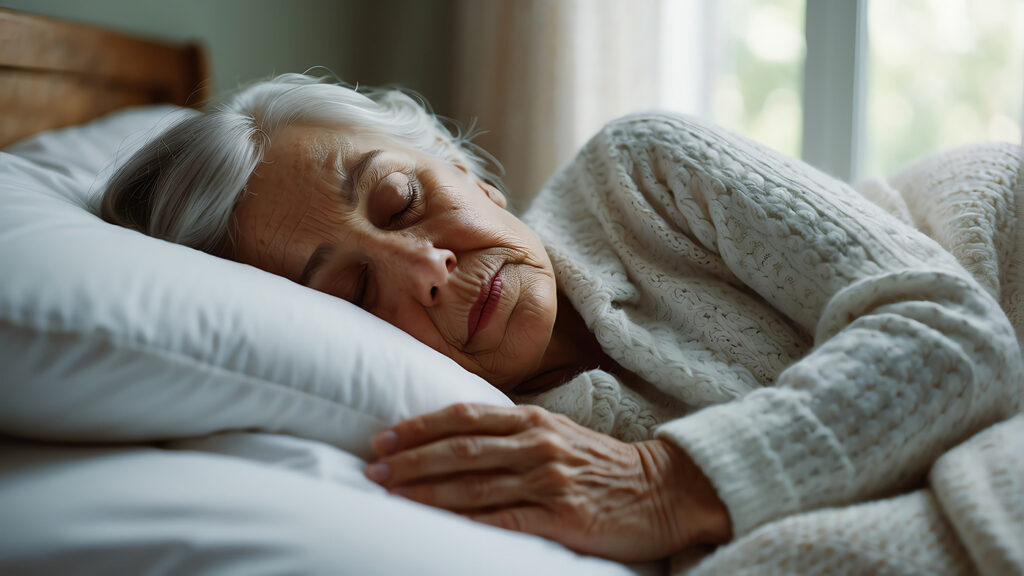Why Does My Loved One with Dementia Sleep So Much?

The evidence is definitive: sleep affects the brain. Whether that’s too little sleep, disrupted sleep or even too much sleep. Because of this connection, sleep patterns and dementia are often studied together. You’ve probably read the research that has found prolonged sleep deprivation (getting less than six hours of sleep per night) can increase your chances of developing dementia. And you probably know that dementia can be disruptive to sleep, causing your loved one to sleep less at night. But dementia is also linked to too much sleep.
While more sleep is typically considered healthy, for someone who is living with dementia, abnormal amounts of sleep can be concerning for caretakers. Understanding why your loved one is sleeping more than usual will help you know if her sleep pattern is a normal part of dementia or if you should make some adjustments to her care.
Do people with dementia sleep a lot?
The most common reason dementia may be causing your loved one to sleep more than usual is that the disease has progressed into the later stages.
As this expert explains, sleep during late-stage dementia can be compared to sleep in infants. Infants sleep around the clock, only waking to eat and be awake for a short window before needing to sleep again. This is because their brains are working hard to take in all the new sights, smells and sensations outside the womb. This stimulation causes them to feel tired and need more rest than older babies and toddlers.
In a reverse way, this is what is happening for those who are living with dementia in the final stages. Activity, communication and movement are more exhausting for them, not because their brains are developing but rather because their brains are deteriorating and can no longer handle stimulation the way they used to. Because of this, your loved one will likely sleep a lot during the day and maybe more at night during the later stages of the disease.
Another cause for atypical sleep could be due to the type of dementia your loved one has. Sleeping more than usual is a common symptom of vascular dementia, a type of dementia caused by a lack of blood flow to the brain. In addition, dementia caused by Parkinson’s disease or Lewy bodies may cause someone to sleep more during the day and restlessly at night.
Medication could also be causing your loved one to feel sleepier than usual. People with dementia often have coexisting conditions that require medications. Antipsychotics, antihistamines and antidepressants can all cause drowsiness. If your loved one is taking medication to help with sleep since dementia can make sleeping more difficult, his dosage may need to be adjusted if the medication is causing him to sleep more than usual.
When to Talk to Your Doctor
While sleeping more than usual is a common symptom of late-stage dementia, it is recommended to speak to your loved one’s doctor if her sleep patterns suddenly change. This could indicate a problem with a medication, illness or another complication that should be addressed immediately.
Excessive Sleep as an Early Sign of Dementia
In addition to prolonged sleep being a symptom of later-stage dementia, prolonged sleep may also be an early indicator of dementia.
According to this 2017 study, participants whose sleeping patterns changed from sleeping less than nine hours per night to sleeping more than nine hours per night were at higher risk for developing Alzheimer’s disease. (Those who slept less than six hours per night were also at higher risk.)
As this expert explains, prolonged sleep could be a sign of deterioration in regions of the brain responsible for sensing light and waking the brain up at appropriate times.
While this study certainly doesn’t suggest anyone who sleeps more than nine hours per night will develop dementia, it does point to what could be an early symptom of dementia that physicians can flag, allowing for early intervention.
Whether your loved one is experiencing sleep disruptions due to dementia or sleeping more, if you have any concerns, always check with your doctor. She can assure you if the sleep is a normal symptom of neurodegeneration, or if it’s due to something controllable that you can improve with some adjustments to your loved one’s care. Whatever the issue, make proper sleep a priority for your loved one and for you.





